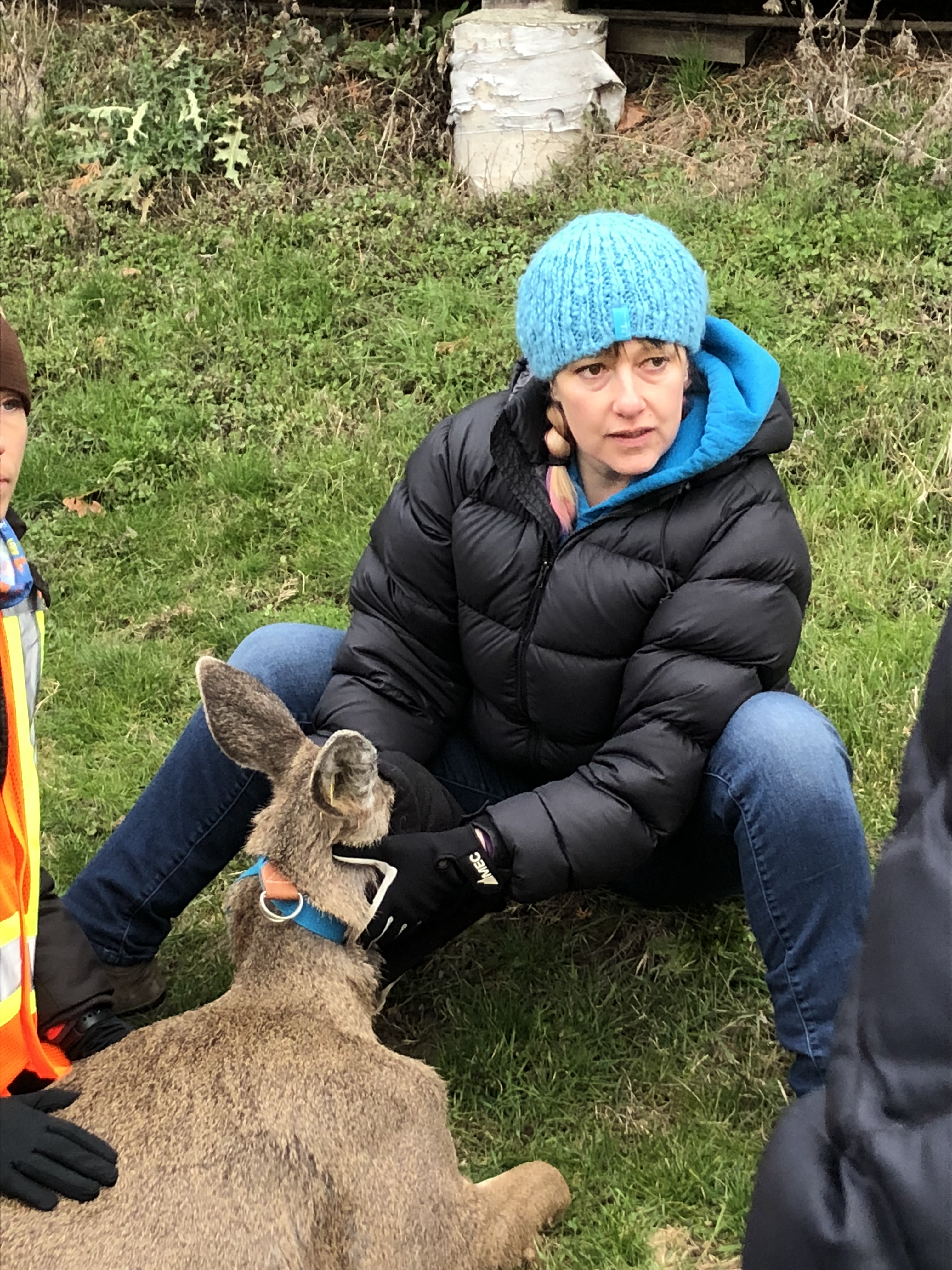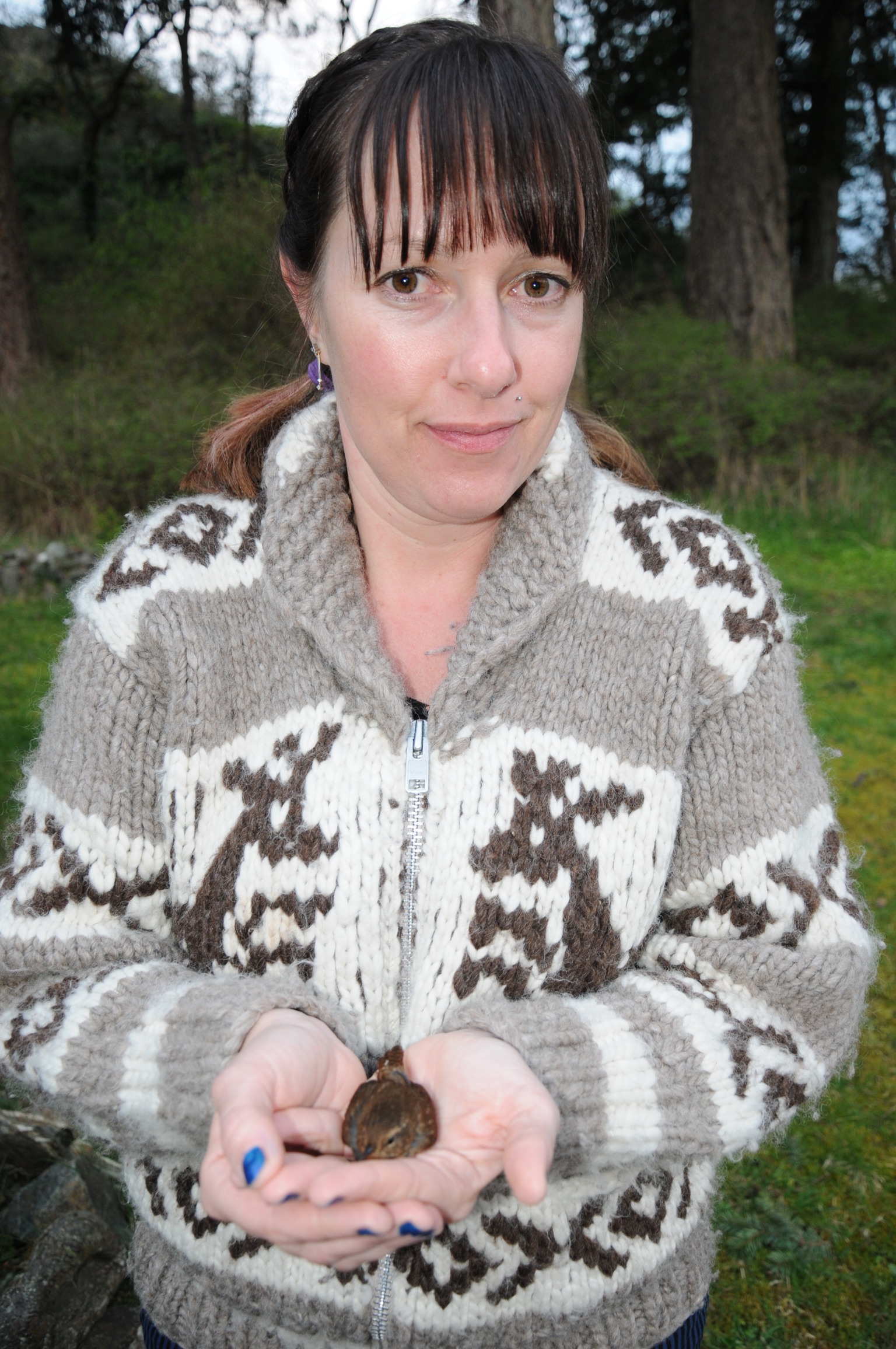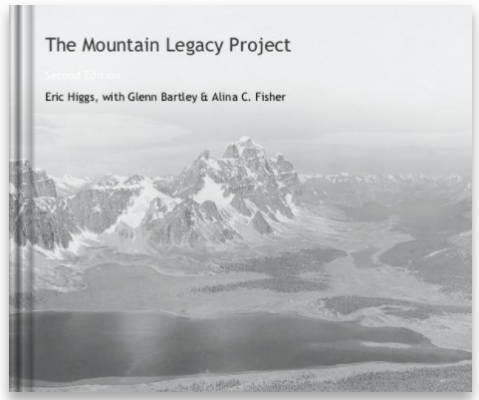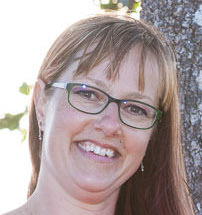
Alina Fisher
Ph.D. Student, and Research Manager, University of Victoria, Environmental Studies
Science communication and outreach, Invasive species, Wildlife conservation, Ecology, Science communication and outreach, Science communication, Population Ecology,
Environmental Services, Fishery and Aquaculture, Forestry/Forest Products, Non-Profit/Charitable Sector, Research, Landscaping, Floriculture and Horticulture, Social Media
Media
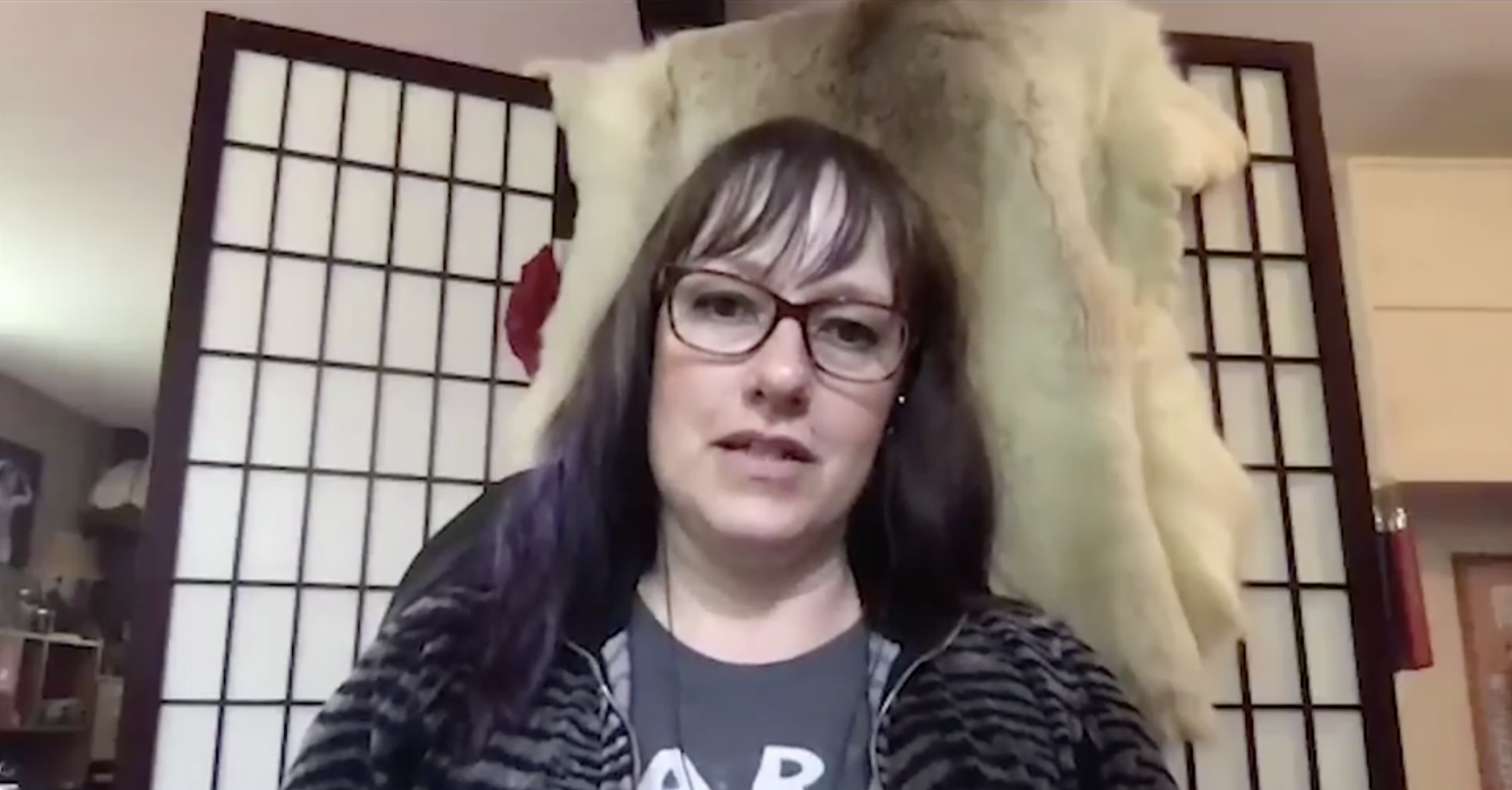
Oak Bay deer project off to promising start
CBC, May 12, 2014Radio/Podcast
Alina Fisher spoke with CBC Daybreak North about her recently published paper about invasive atlantic salmon found in Pacific coastal salmon streams
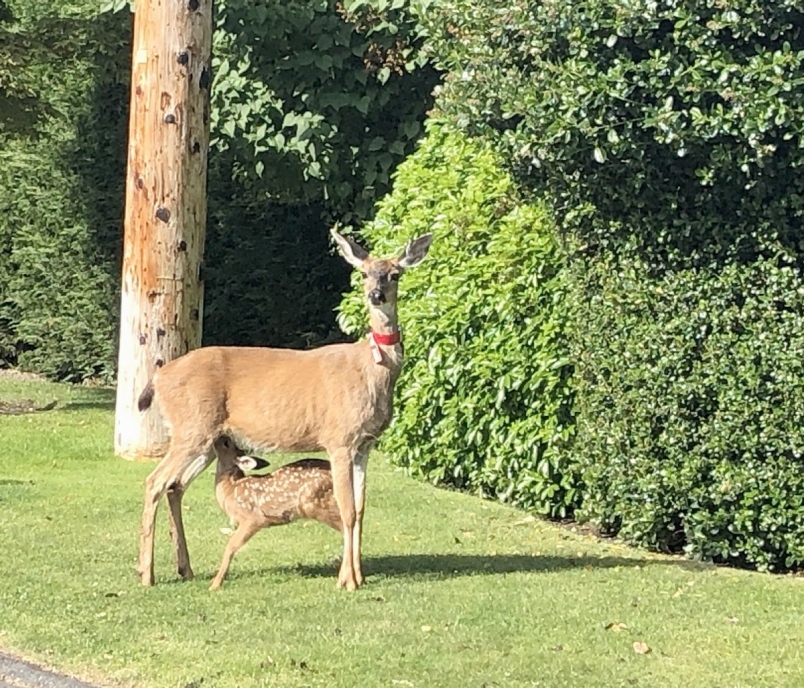
Researchers optimistic on deer birth control in Oak Bay
Times Colonist, June 9, 2020Print

Thousands of scientists sign open letter declaring Earth is facing a ‘climate emergency’
The Globe and Mail, November 5, 2019Print
One of the signatories on the open letter declaring a climate emergency, Alina provided comment on the climate crisis and its impacts around the world.
This piece has been picked up by the National Post, CTV News, Huffington Post, and more.
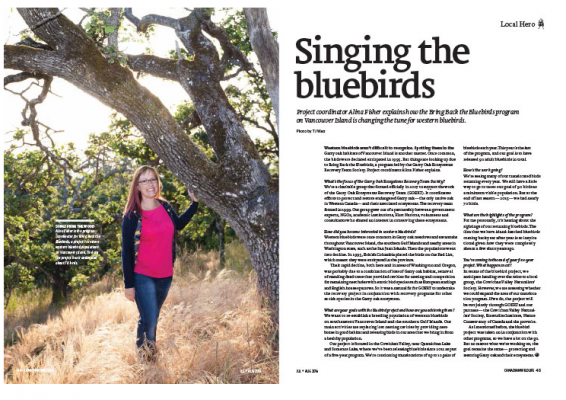
Singing the bluebirds
Canadian Wildlife Magazine, July 1, 2016Print
URL: http://cwf-fcf.org/en/news-features/magazines/canadian-wildlife/ja2016/localhero.html
Project coordinator Alina Fisher explains how the Bring Back the Bluebirds program on Vancouver Island is changing the tune for western bluebirds
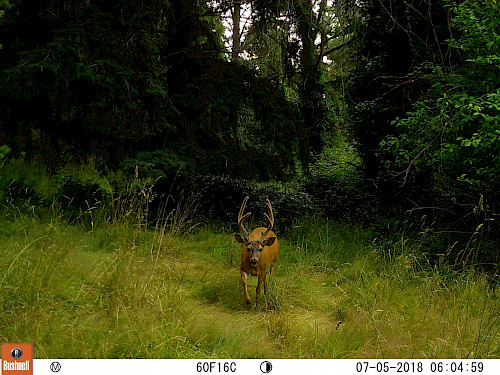
Living with Wildlife: Oak Bay Deer Study
WildCam, January 8, 2020Online
URL: https://wildcams.ca/blog/living-with-wildlife-oak-bay-deer-study/
When you think of deer, do you think of a doe feeding in a wilderness meadow, the Disney movie Bambi, or of the light up decorations that were on display over Christmastime in front yards across Canada? For many people, deer are just that—something far away, a cartoon, or merely an inanimate decoration. However, in some cities in British Columbia, deer are a common, yet divisive, part of the urban landscape.
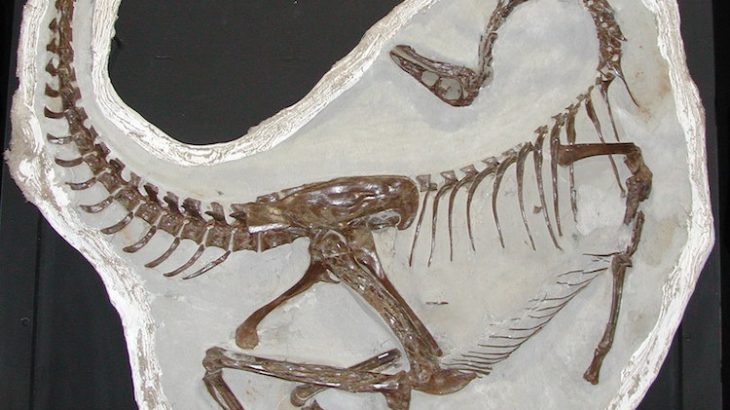
Beyond the bones, Part 2: Exceptional preservation in dinosaur fossils – dinosaur “mummies”
Science Borealis, March 30, 2020Online
In Part 1 of this two-part series, we discussed findings that have given us fascinating new insights into the inner workings of dinosaurs and snapshots of dinosaur appearance, but dinosaur “mummies” are even more exciting and revealing.

Beyond the bones, Part 1: Exceptional preservation in dinosaur fossils—proteins, blood vessels, medullary bone, and beaks and bills
Science Borealis, December 2, 2019Online
New and exciting discoveries are being made in the field of dinosaur palaeontology all the time, and that includes more than just bones. Find out more!

Putting woodland conservation into the social media conversation
MITACS, December 1, 2017Online
URL: https://www.mitacs.ca/en/impact/putting-woodland-conservation-social-media-conversation
From her earliest days as a child bringing home wounded birds and other critters, Alina Fisher has always had a passion for helping wildlife and the environment. That love of nature developed into a drive to become a biologist, but during her studies, Alina realized a pressing need for researchers to engage the public.

Of dragonglass and men: Parallels and differences between Westeros and Earth
Science Borealis, August 12, 2019Online
The parallels between Game of Thrones and reality here on Earth is striking. This piece looks at similarities between our two worlds and at the implications of climate change.

Where the (Re)Wild Things Are
Science Borealis, February 25, 2019Online
URL: https://blog.scienceborealis.ca/where-the-rewild-things-are/
Looking at the impacts of rewilding as a conservation and restoration tool.
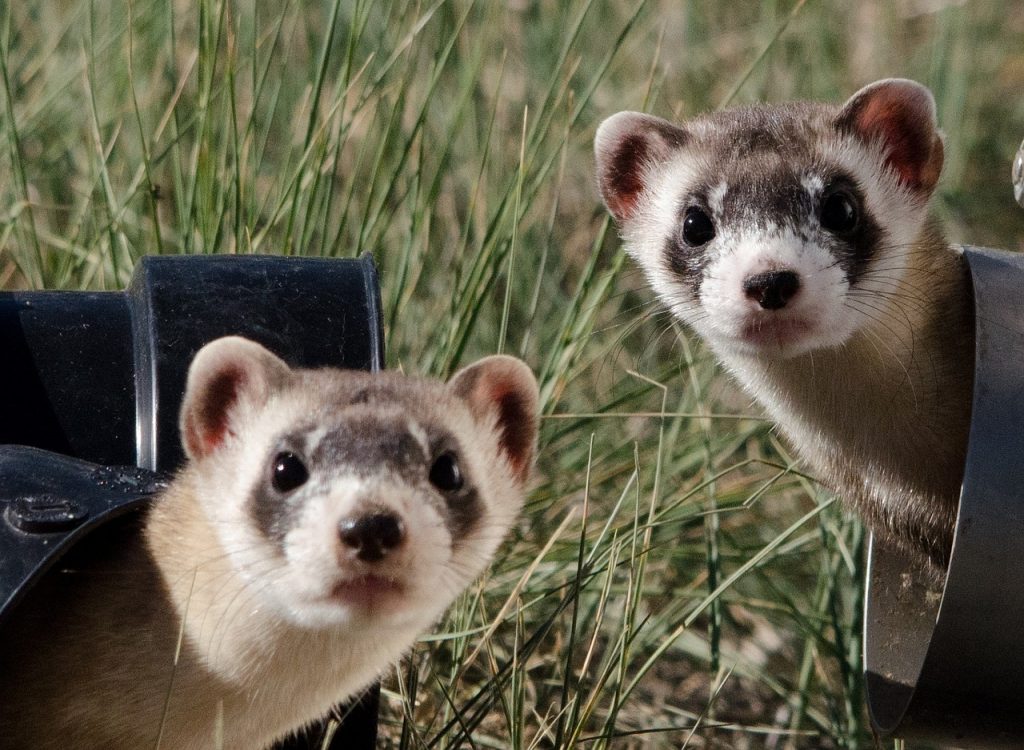
Charismatic organisms, “lost causes”, and conservation priorities
Science Borealis, October 29, 2018Online
URL: https://blog.scienceborealis.ca/charismatic-organisms-lost-causes-and-conservation-priorities/
Can we save species that are beyond threshold numbers for a self-sustaining population?

Withering wildlife: Will Canada Target 1 conservation goals effectively protect our unique biodiversity?
Science Borealis, August 7, 2018Online
How effective are our National Parks systems at ensuring the conservation of species at risk?

Move to Mars? Just because we can doesn’t mean we should…
Science Borealis, May 14, 2018Online
URL: https://blog.scienceborealis.ca/move-to-mars-just-because-we-can-doesnt-mean-we-should/
Should we focus our efforts on colonizing our neighbouring planet, Mars, or should we focus those resources and effort at combatting climate change?
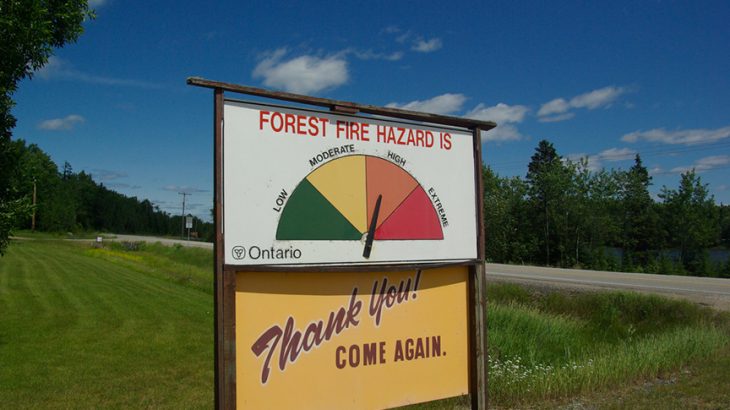
Climate change, fire, and their implications for species
Science Borealis, January 29, 2018Online
URL: https://blog.scienceborealis.ca/climate_and_fire/
Looking at how climate change is changing fire intensity and frequency, and the role these changing fire regimes have in species.
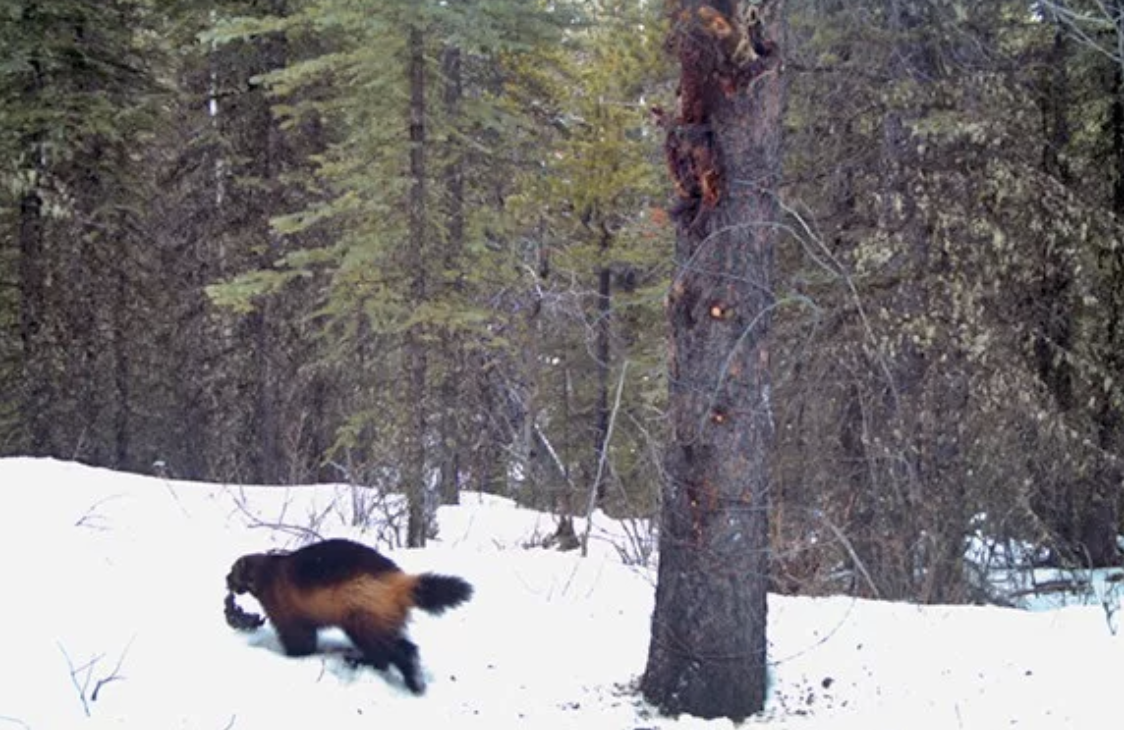
The elusive wolverine: Beyond the X-Men character
Science BorealisOnline
URL: http://blog.scienceborealis.ca/the-elusive-wolverine-beyond-the-x-men-character/
A look at research on wolverines (Gulo gulo) in the Canadian Rocky Mountains.
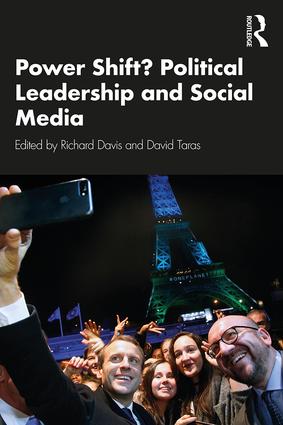
“The Visually Viral Prime Minister: Justin Trudeau, Selfies, and Instagram edited by David Taras & Richard Davis.” Chap. 5 In Power Shift?: Political Leadership and Social Media
by Remillard, C., L. M. Bertrand, and A. C Fisher
Routledge
December 10, 2019
Power Shift? Political Leadership and Social Media examines how political leaders have adapted to the challenges of social media, including Facebook, Instagram, Twitter, and memes, among other means of persuasion. Established political leaders now use social media to grab headlines, respond to opponents, fund raise, contact voters directly, and organize their election campaigns. Leaders of protest movements have used social media to organize and galvanize grassroots support and to popularize new narratives: narratives that challenge and sometimes overturn conventional thinking. Yet each social media platform provides different affordances and different attributes, and each is used differently by political leaders.
In this book, leading international experts provide an unprecedented look at the role of social media in leadership today. Through a series of case studies dealing with topics ranging from Emmanuel Macron and Donald Trump's use of Twitter, to Justin Trudeau's use of selfies and Instagram, to how feminist leaders mobilize against stereotypes and injustices, the authors argue that many leaders have found additional avenues to communicate with the public and use power. This raises the question of whether this is causing a power shift in the relationship between leaders and followers. Together the chapters in this book suggest new rules of engagement that leaders ignore at their peril.
The lack of systematic theoretically informed and empirically supported analyses makes Power Shift? Political Leadership and Social Media an indispensable read for students and scholars wishing to gain new understanding on what social media means for leadership.
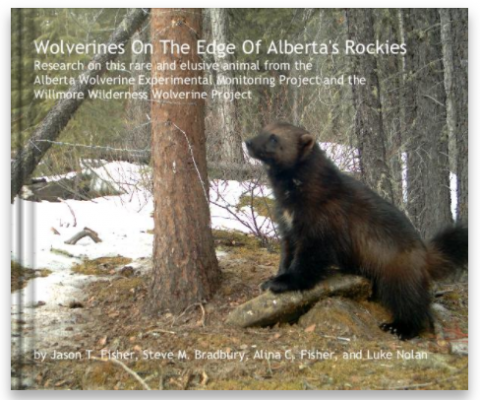
Wolverines on the edge of Alberta's Rockies
by Jason T. Fisher, Steve M. Bradbury, Alina C. Fisher, and Luke Nolan
Blurb
December 9, 2009
Wolverines are enigmatic creatures. They are the stuff of legend – fearsome, dauntless, and possessed of a fabled toughness. In fact, the legend is tougher than the animal. True, they are mysterious, as wolverines are rare and occur at low densities. Where they do occur, they are elusive, so wolverine research requires time and patience. This book summarizes our 6-year search for rare and elusive wolverines in the Alberta Foothills and west-central Rocky Mountains, and highlights a few things...
Blurb
February 25, 2009
The second edition of the work of the Mountain Legacy Project.
Bring Back the Bluebirds Project – Five Years Later
by Schaefer, V, and A.C. Fisher
Published by BC Nature
November 1, 2017
Review of the Bring Back the Bluebirds project to reestablish the extirpated Western Bluebird back to Vancouver Island.
URL: https://www.bcnature.ca/wp-content/uploads/2017/08/BCnature-Fall-web.pdf
Bring Back the Bluebirds Project – Five Years Later
by Schaefer, V, and A.C. Fisher
Published by Bluebird Magazine
November 1, 2018
Review of the Bring Back the Bluebirds project to reestablish the extirpated Western Bluebird back to Vancouver Island.
Black-tailed Deer Distribution, Home Range, and Population Density in Oak Bay, BC.
by Frey, S, Burgar, J, Fuller, W, A.C. Fisher, and JT Fisher
May 1, 2019
Report to Oak Bay Council & Province of British Columbia.
Occupancy dynamics of escaped farmed Atlantic salmon in Canadian Pacific coastal salmon streams: implications for sustained invasions
Published by Biological Invasions
February 13, 2014
Farmed non-native Atlantic salmon (Salmo salar) is the largest agriculture export product of British Columbia, Canada. Chronic low-volume escapes of salmon from farms into Pacific waters (“leakage”) are typically undetectable (Britton et al. 2011). Analysis of escape-reporting from farmers indicates that reports greatly underestimate the true number of Atlantic salmon inadvertently released from open-net pen rearing sites (Morton and Volpe 2002). To quantify the spatial extent of escaped Atlantic salmon in Canadian Pacific rivers, we systematically snorkel-surveyed 41 known Pacific salmon (Oncorhynchus spp.)-supporting rivers and creeks on Vancouver Island over a span of 3 years. We estimated and accounted for imperfect detections using multi-season occupancy models. We detected Atlantic salmon in 36.6 % of surveyed rivers. After accounting for imperfect detection, occupancy models estimated that over half of surveyed streams across the study area contained Atlantic salmon, and that 97 % of streams with high native salmon diversity were occupied by Atlantic salmon. Even in intensive snorkel surveys, Atlantic salmon are detected in occupied streams only 2/3 the time, suggesting abundance and distribution of non-native salmon is greater than indicated by the only existing data. Further, Atlantic salmon are more likely to occupy streams with high native Pacific salmon diversity—and more likely to maintain occupancy across years—potentially increasing competitive pressure on native salmonids. Understanding local biotic and abiotic predictors of Atlantic salmon occupancy, stream colonization, and local extinction requires more data; the same is true for the effects of escaped Atlantic salmon on local salmon diversity and sustainability. These data for the first time show that Atlantic salmon occupy Pacific coastal rivers for multiple years. The impact of Atlantic salmon occupancy in British Columbia rivers must be factored into policy decisions regarding the future of salmon farming in the provincial waters.
URL: http://link.springer.com/article/10.1007/s10530-014-0653-x
Biography
Born in Romania, Alina Fisher's early childhood memories revolve around feeding wildlife, exploring forests and beaches, and bringing home any wild animal she could find. Fisher studies population and community ecology in diverse ecosystems, including yucca-yucca moth pollination system, mycorrhizal fungi associated with Jack Pine, the impact of escaped farmed Atlantic Salmon in Pacific coastal streams, and species recovery efforts of the Western Bluebird to Vancouver Island. As a science communicator, the prevalence of pseudo-science and fake science on social media led Fisher to study the barriers to effective science communication. Her thesis research was nominated for the Governor General's Gold Medal in research excellence. Fisher is also a Ph.D. student in Environmental Studies at the University of Victoria, researching changes in wildlife communities in response to climate change and human land use, as well as public attitudes to the value of conservation.
Recognition/Reconnaissance
Local Hero | Professional
Recognized by the Canadian Wildlife Federation for the work reintroducing the extirpated Western Bluebird back to Vancouver Island.
MITACS 150 for 150 | Professional
Recognized as one of Canada's top 150 up-and-coming researchers during Canada's 150th anniversary of Confederation.
Governor General's Gold Medal Nominee (2017) | Professional
Nominated for the Governor General's Gold Medal in research excellence
Research Grants
Accelerate Internship
Organization: MITACSDate: September 1, 2016
Details:
MITACS Accelerate Internship


